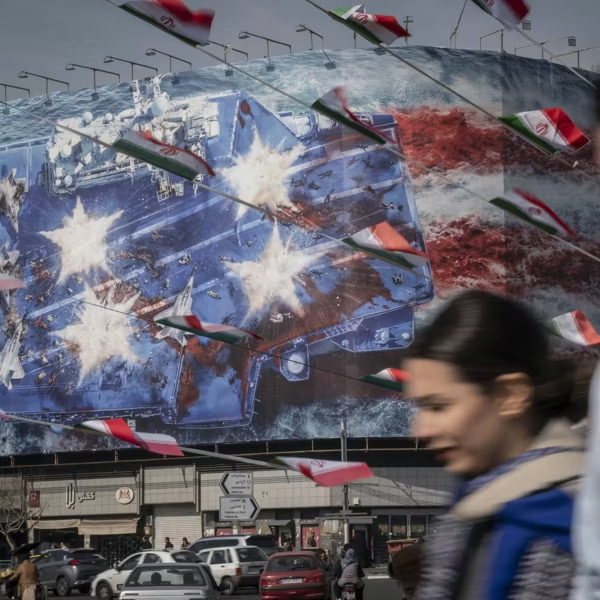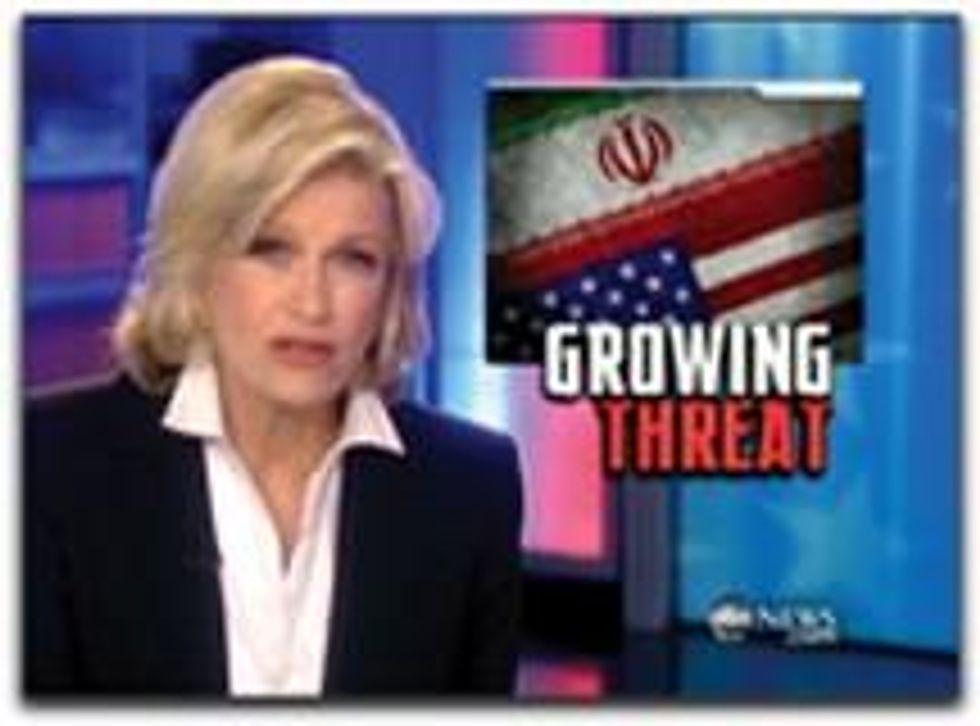Claims that Iran has a nuclear weapons program are allegations, not facts (Extra!, 1/12)--but are treated as established background material in the corporate media: "The president, as you know, has been trying to force Iran to give up its nuclear weapons program," explains CBS Evening News anchor Scott Pelley (2/6/12). The Washington Post editorializes (1/11/12) that Iran's "drive for nuclear weapons continues."
At the end of January, another provocative claim emerged: Iran was ready to unleash terrorism against the United States.
ABC World News (1/31/12) featured a blatantly propagandistic report on the Iranian threat. "America's top spy warns that Iran is willing to launch a terrorist strike inside the U.S.," announced anchor Diane Sawyer at the top of the program. "We'll tell you his evidence."
The ABC report was actually very light on evidence, but heavy on incendiary allegations from government officials--without the skeptical scrutiny that should be journalism's primary function. The report was pegged to that day's Senate testimony by James Clapper, director of national intelligence, who told lawmakers that the U.S. intelligence community believes that Iran may be "now more willing to conduct an attack in the United States in response to real or perceived U.S. actions that threaten the regime."
Sawyer amplified Clapper's allegation by setting up the report with the assertion that Iran is "more determined than ever to launch an attack on U.S. soil." Correspondent Martha Raddatz, claiming that the "the saber-rattling coming from Iran has been constant," told viewers that Clapper delivered "a new bracing warning.... Iran may be more ready than ever to launch terror attacks inside the United States."
In its effort to substantiate Clapper's claim, ABC could provide only the flimsiest evidence: Raddatz announced that Clapper "pointed specifically to last year's plot to assassinate the Saudi ambassador to the United States and to reports that Iran has been supporting Hezbollah cells in Latin America."
From the beginning, there have been serious questions about the ambassadorial assassination plot (IPS, 10/17/11; FAIR Blog, 10/12/11). As University of Michigan professor Juan Cole (Informed Comment, 10/12/11) pointed out, the claim that the Iranian government tried to hire a Mexican drug gang to kill a diplomat "makes no sense." The Wall Street Journal (2/1/12) quoted Karim Sadjadpour of the Carnegie Endowment for International Peace saying, "If that's the only data point, I think it's a stretch to conclude that the regime is now looking to commit acts of terror on U.S. soil." But in ABC's report, it's unquestioned fact.
The idea that Iran is supporting Hezbollah cells in Latin America has been challenged as well--as PolitiFact noted (11/22/11), the State Department determined there are actually no such groups in our hemisphere. Still, ABC milked the propaganda value of Latin America, running footage of Iranian President Mahmoud Ahmadinejad visiting other Official Enemies of the United States: "Ahmadinejad recently traveled there, meeting leaders like Hugo Chavez of Venezuela and Fidel Castro who have little love for the U.S." (Note: The original ABC broadcast had Ahmadinejad meeting with farmworker organizer Cesar Chavez).
ABC also illustrated the supposed Iranian threat with stock footage of weaponry and soldiers from an Iranian military parade--suggesting without spelling it out that viewers ought to feel threatened by a military force roughly 1/40th the size of the United States' armed forces.
ABC may have laid the propaganda on thicker than most, but few could resist running with the notion that Iran is an emerging threat to the United States. CNN host Wolf Blitzer (1/31/12) declared, "Key U.S. intelligence officials now warning Iran may be preparing to launch a terrorist attack right inside the United States." On NBC Nightly News (1/31/12), anchor Brian Williams announced: "Iran's threat. Not just the nuclear program. Tonight, U.S. intelligence warns Iran may be prepared to strike on American soil."
On ABC's Good Morning America (2/3/12), Raddatz was still hitting that point, saying that "what is really worrying" U.S. officials is "an attack on the homeland." As she explained:
I have never heard the intelligence chief say anything like that, that Iran could actually move into America, that there might be sleepers here willing to attack if Israel attacks Iran. That's why there's so much concern.
Some pundits, like Newsweek's Niall Ferguson (2/13/12), could hardly wait for war:
War is an evil. But sometimes a preventive war can be a lesser evil than a policy of appeasement. The people who don't yet know that are the ones still in denial about what a nuclear-armed Iran would end up costing us all. It feels like the eve of some creative destruction.
But even those with less obvious glee for war still managed to echo the logic of the Iraq invasion. ABC's Raddatz explained on the February 3 World News broadcast:
Well, I think it could be avoided, but you have to say it's up to Iran. Israel has to see something concrete. They have to see Iran shutting down its nuclear weapons program.
Iran must, in other words, give up the thing they claim does not exist.
SIDEBAR: Disappearing Weapons
On January 5 the New York Times reported on "a recent assessment by the International Atomic Energy Agency that Iran's nuclear program has a military objective." Contrary to much of what you might pick up from the corporate media, there is no such IAEA report.
The Times promptly changed the Web version of the article--removing the relevant paragraph but without noting the error. Times public editor Arthur Brisbane (1/10/12) agreed with FAIR activists who wrote to the paper: "The Times hasn't corrected the story but it should, because this is a case of when a shorthand phrase doesn't do justice to a nuanced set of facts."
It's one thing to quietly delete an error. The PBS NewsHour did something very different--editing out an inconvenient fact.
NewsHour correspondent Margaret Warner told viewers on January 9 that
the Iranian government insists that its nuclear activities are for peaceful energy purposes only, an assertion disputed by the U.S. and its allies. On CBS yesterday, Secretary of Defense Leon Panetta repeated international demands that Iran stop enriching uranium.
Viewers then saw Panetta saying this:
But we know that they're trying to develop a nuclear capability, and that's what concerns us. And our red line to Iran is, do not develop a nuclear weapon. That's a red line for us. They need to know that, if they take that step, that they're going to get stopped.
What came before the word "But"? Panetta had said this: "Are they trying to develop a nuclear weapon? No."
So Panetta's statement--that Iran is not building a nuclear weapon--is being used to argue that the United States disputes Iran's long-standing contention that it is not building a nuclear weapon.
That was how FAIR saw it (FAIR Blog, 1/10/12), and PBS ombud Michael Getler agreed (1/12/12), up to a point. Getler called it a "good journalistic catch," then argued that
the logical understanding that NewsHour viewers--and anyone who has been following this subject--would draw from the portion of the Panetta quote that was used is that Iran does not have a nuclear weapon but that they are developing a "nuclear capability" and that the U.S. warning, as Panetta expressed it, is not to cross "our red line" and actually develop a weapon.
So viewers who are paying close attention to Iran coverage (the accurate portions, that is) would know that when Panetta was saying, "We know that they're trying to develop a nuclear capability," he meant that they were not trying to develop a nuclear weapon--even though the program had set up his statement by saying the U.S. doesn't believe that, and edited out his very straightforward explanation of what is actually known about the state of Iran's nuclear program.
It's a curious argument. One of the things that made Panetta's comment so revealing was that it represented a break from the usual chatter about Iran--even within the Obama administration. That's precisely what made it newsworthy. PBS seems to think its viewers should have to read between the lines in order to arrive at the accurate assessment about Iran's nuclear program that was left on the cutting room floor.




